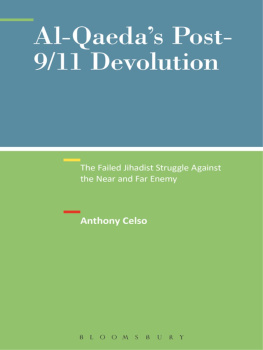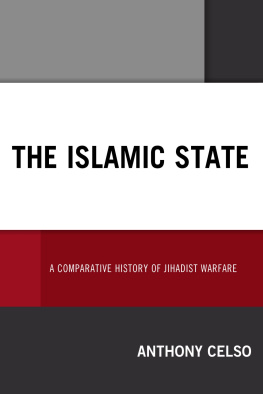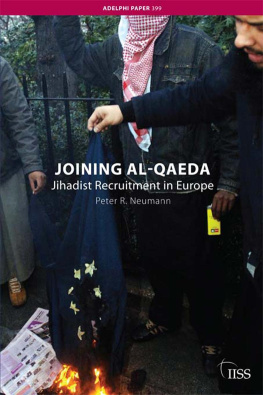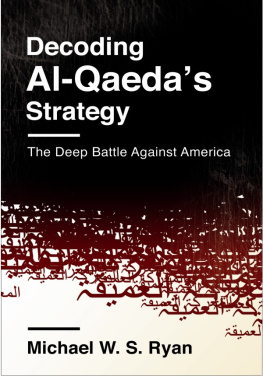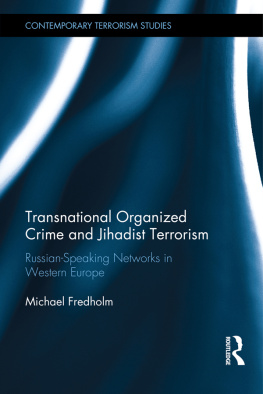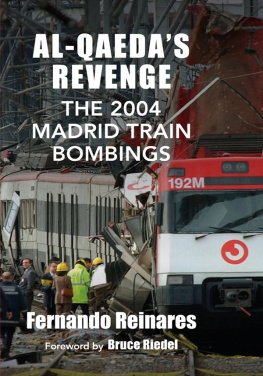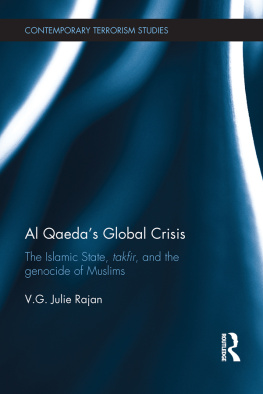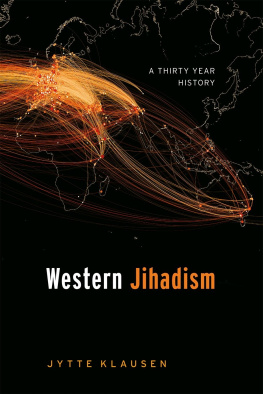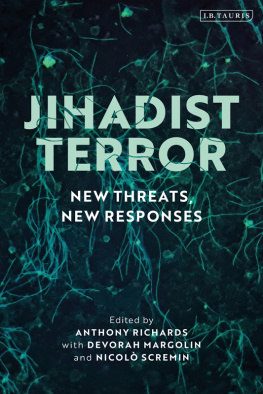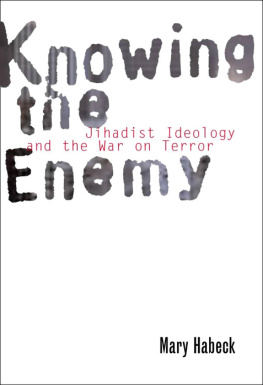There are a number of people and organizations that I would like to acknowledge that have assisted in the writing of this book. First and foremost, I would like to thank my two colleagues at the Department of Security Studies at Angelo State University Dr Bruce Bechtol Jr and Dr Robert Ehlers for their consistent support, advice, and encouragement in the writing of this book. Additional thanks must be given to the work of the Foreign Policy Research Institute of Philadelphia (FPRI), the Combating Terrorism Center (CTC) at West Point, the Long War Journal and Madrids Real Instituto Elcano (RIE) whose reports, analyses, and studies have immeasurably assisted the development of the arguments established in this book. Special recognition must be given to the work of Spanish terror expert Fernando Reinares, whose analysis of the Madrid terror attacks and al-Qaedas penetration of the 3/11 network has played a critical role in my analytical framework regarding al-Qaedas post-9/11 strategy, and mention must be made to the pioneering analysis of FPRIs late scholar Michael Radu whose assessment of Radical Islam in my view has no peer. His untimely death greatly hurts the study of terror groups and deprives us all of his brilliant insight. I am also deeply indebted to one of the blind reviewers working for Bloomsbury Press whose potent suggestions and criticism of my book proposal helped immeasurably in the writing of this project. His/her wise counsel propelled my exploration of al-Qaedas historical and tactical evolution. I also feel moved to acknowledge the role of the editors of Mediterranean Quarterly including Nikolaos Stavrou whose support for my past research has culminated in this book. Finally, I must recognize the help of my adorable 12-year-old Maine Coon cat Jezebel who sat on my lap during the writing of this project and while physically she hindered my work, her sweet and loving disposition in some mysterious way assisted the books completion.
Anthony Celso, July 16, 2013
I begin this message with condolences for myself and you on the death of our dear brother Shaykh Said, God rest his soul. May the Almighty honor him with what he desires.... I also offer condolences on the deaths of our dear brothers Abu-Umar al-Baghdadi and Abu Hamza al-Muhajir and those who waged Jihad with them until they died.
Osama bin Laden
This book is about the post-9/11 devolution of al-Qaeda and the emergence of its affiliates, insurgent and associated organizations. Al-Qaedas jihadist war against the United States has been transformed into a complex fractured struggle waged by determined and fanatical Islamists. Some of the battles have been triggered by international interventions in Afghanistan and Iraq. Most, however, are the consequence of local grievances cojoining with the dramatic growth of jihadist intellectual currents that have engulfed the Muslim world. These struggles as the Syrian civil war vividly demonstrates have a pronounced sectarian and localized nature that has blunted al-Qaedas emphasis in attacking the American far enemy.
Devolution involves the erosion of an organizations central authority and the empowerment of its local branches to develop and implement policy. Prior to 9/11 al-Qaeda was very much a hierarchy where specific decisions and policies were made by a few key leaders. Peter Bergens early work on al-Qaeda describes it as corporate enterprise with bin Laden as its Board Chairman.able to direct al-Qaedas military, financial, and media operations. The historic Saudi leader determined targets, selected attack teams, and allocated funds for each project. The American military retaliation after 9/11 shattered al-Qaeda command and control capability and effectively fragmented the organization into a loose network of aligned groups and affiliates.
Al-Qaedas post-9/11 predicament is similar to the plight of criminal organizations facing severe law enforcement pressure. Given law enforcement and financial pressures this diffuse network of individual cells began to pursue agendas that diverged from the wishes of a weakened central headquarters. The fragmentation can be severe enough that individual nodes break from the parent organization and become their competitors and antagonists.
The rise of the paramilitary Los Zetas is emblematic of the organizational fissures affecting the Mexican drug trade. Composed of ex-Special Forces personnel, Los Zetas were originally hired killers for the Gulf Cartel that eventually formed their own ultraviolent criminal organization eventually challenging the hegemony of its Gulf parent organization.
With its hierarchical chain of command disrupted after 9/11, al-Qaeda experienced severe centrifugal pressures. Organizationally bin Ladens group flattened out with regional and local emirs taking on more responsibility to develop policy. The progression of al-Qaeda affiliates in Iraq, the Maghreb, Somalia, and Yemen is a consequence of regional emirs joining with local jihadists who swore fidelity to bin Ladens leadership. The severity of al-Qaedas losses in the US military counterstrike forced the organization, furthermore, to reach out to other jihadist organizations to develop a common response to the US war on terror. Its previous relations with groups like the Moroccan Islamic Combat Group (MICG) and the Southeast Asian Jemaah Islamiyah (JI) facilitated this process where al-Qaeda hope to inspire these groups to attack Western interests.
Some analysts have viewed this organizational fragmentation as a source of al-Qaeda strength and a few even saw it as a confirmation that the West is losing the war on terror.
Al-Qaedas appendages in Yemen, Somalia, Iraq, Afghanistan, and the Maghreb hoped to draw the United States into many fronts vexing and exhausting the American superpower. Faced with mounting troop losses and economic burdens created by the war on terror, the American monolith would disengage from the Middle East allowing al-Qaeda the ability to exploit a power vacuum. Al-Qaeda theorists Abu Musab Suri and Abu Bakr Naji wrote voluminous treatises on the inevitable defeat of the United States beleaguered in its ability to subdue valiant bands of Muslim fighters.
They believed that the West would inevitably succumb to this vexation and exhaustion strategy. Some Western academics agreed with his prediction. In fact, it was expert opinion in 2006 that al-Qaeda had succeeded in Iraq and the country was inexorably headed for civil war. These analysts reckoned that the best realist strategy was to withdraw and cut American losses. It is now clear that had this advice been taken that an al-Qaeda victory would be a foregone conclusion.
While the al-Qaeda is winning the war on terror perspective still has adherents, the potency of their arguments has diminished. Al-Qaeda reverses in Iraq, the hollowing of its leadership by Predator drone attacks in Waziristan, the travails of many of its affiliates and the death of Osama bin Laden (OBL) are one of many factors that suggest the jihadist movement has stalled. Significant declines in al-Qaedas support across the Muslim world reinforced by the emergence of the prodemocracy Arab Spring movement has weakened the jihadist cause.

